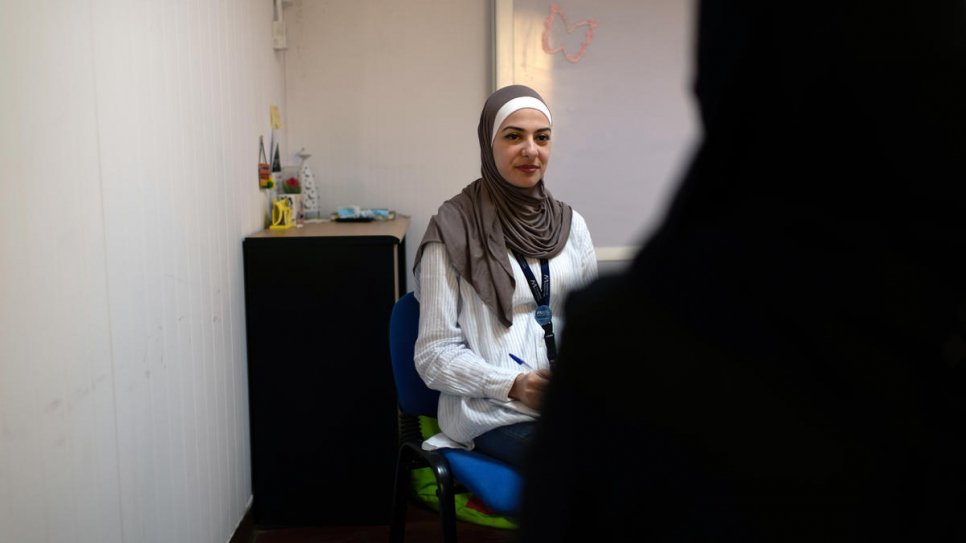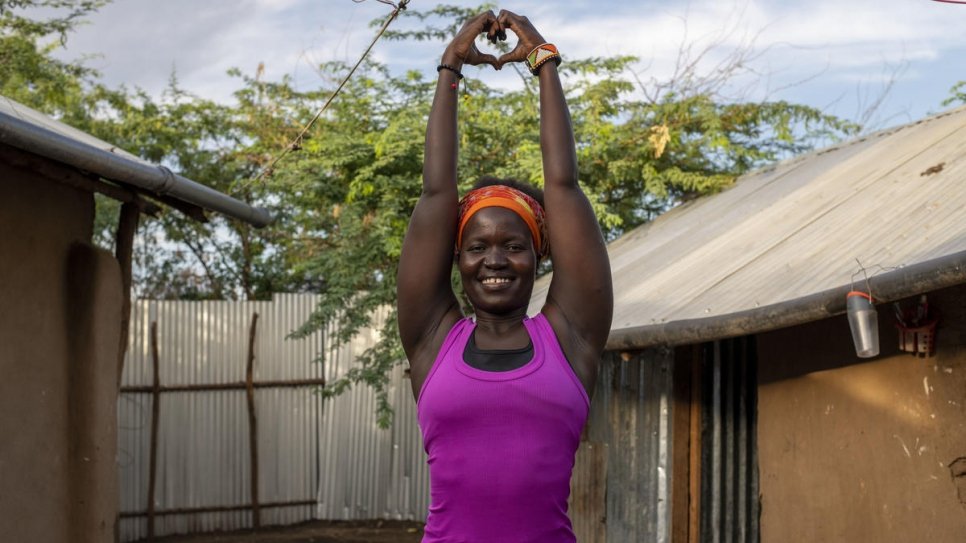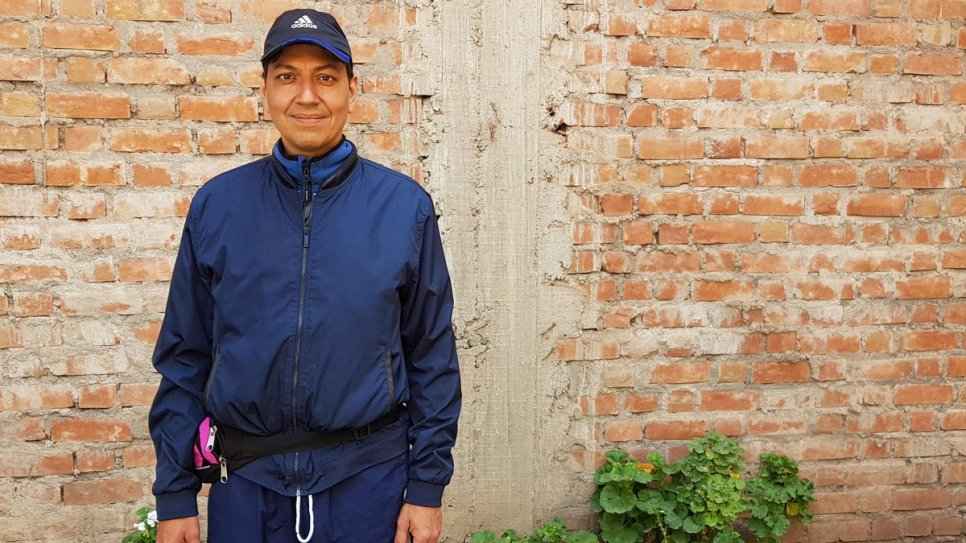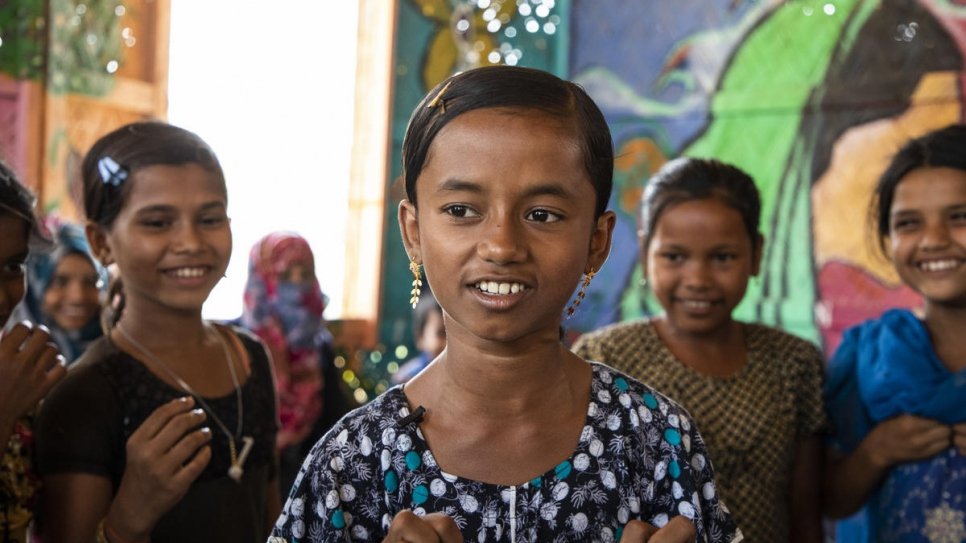Q&A: 'Before the pandemic, refugee mental health was severely overlooked. Now it's a full-blown crisis'
UNHCR's Senior Mental Health Officer Pieter Ventevogel says COVID-19 has been a tipping point for many refugees in distress. But with the crisis comes an opportunity.
A South Sudanese refugee sits outside his shelter in Uganda's Bidibidi settlement, November 2019. His wife was diagnosed with bipolar disorder in South Sudan in 2012 and she took her own life in exile.
© UNHCR/Rocco Nuri
Psychiatrist Pieter Ventevogel has led UNHCR’s mental health response for the past six years, a time during which the number of people uprooted by conflict and persecution has grown to an unprecedented 79.5 million, including 26 million refugees. He sat down with global website editor Tim Gaynor in Geneva to discuss refugee mental health and how it is being impacted by the COVID-19 pandemic.
What was the state of refugee mental health before the current pandemic?
It varies, but we could use the global estimates from the World Health Organization. One in five – 22.1 per cent – of the adult population in conflict-affected areas have mental health problems. We don’t have data on children, but we can assume it is even a bit higher, because children are more susceptible. That baseline is around two to three times higher than the level in people at large, according to other studies.
Many people assume that Post Traumatic Stress Disorder (PTSD) is the most prevalent condition among refugees, but it is certainly not the only mental health issue they face, and we see it less often than we would expect in the field. There are a lot of people who struggle with events in their countries of origin, or during flight, violent experiences, and even within the country of safety. But PTSD is a specific clinical diagnosis, and when we discuss refugee mental health, we should look beyond one single issue.
The most common problems are in fact depression and anxiety. Depression is often related to loss – a loved one, a home, a job, social standing or social circle. Sufferers see no hope for the future. This can to some extent be mitigated in a setting where you can develop yourself, but in many cases refugees are in limbo, just waiting for something to happen. Solutions do not come easily, and people can lose all perspective that their lives will become better.
As time goes by, we are also seeing that the proportion of people with severe mental health conditions such as schizophrenia or manic depression is on the rise in displacement. We don’t know exactly why – you don’t get schizophrenia through forcible displacement – but there is perhaps an underlying vulnerability, either developmentally or through biology, that can come to expression in certain conditions. When the support system breaks down for these people, they can develop symptoms. In humanitarian settings, people with severe mental health conditions are at high risk of abuse and neglect. That is simply unacceptable.
How has that outlook changed since the pandemic began?
Before the pandemic, refugee mental health was a severely overlooked and under-prioritized issue. Now it is full-blown crisis. Refugees often times see their futures disintegrating. The issues that drove them from their countries remain unresolved, and they can’t go back home. Additionally, many refugees who have survived in exile in the informal economy are losing their livelihoods, if they have a job at all. They see a lack of solutions because resettlement places have gone down with the pandemic. Then people are anxious about their health, not knowing when the pandemic will end, and how they can really protect themselves.
Having these additional stress factors may still be relatively manageable for most people. But if you are already living on the margins, then it can become a tipping point to develop a mental health condition. We can get a sense of this growing desperation in the increase in calls to helplines from refugees who are really afraid, or angry, as well as from people who don’t see a way out and think ‘maybe I should end my life.’ We are also seeing a rise in suicide attempts in Uganda and Kenya, particularly among young people. For me, those are indicators of the underlying stress.
It is difficult to know how widespread this is as the pandemic also impacts help-seeking behaviour. In several places refugees are reluctant to visit health centres because they perceive them as a place where you may fall sick instead of get better. The rise in desperation and the decline in people seeking help for mental health issues is serious. This is now a crisis and can spiral out of hand.
What is UNHCR doing right now to help those who need it?
One priority is to provide guidance on how to cope with the stress around COVID. So we are teaching breathing exercises and also problem solving techniques. Because of their circumstances, refugee populations often have less opportunity to take good care of themselves. They live in cramped houses, they have to go out to find some income, so they have less opportunities to do breathing exercises or use problem solving techniques to get calm because their circumstances are not conducive. But still, it is important to guide such messages about coping.
We are also training staff working with people in distress. It could be literally anyone. It could be a protection officer, it could also be someone working in shelter or in cash disbursement in an urban setting, because they have to deal with refugees who are increasingly frustrated, angry and anxious. The way you do your work can have an effect on wellbeing, if you give the person that you are talking to the feeling that they are being listened to, that you understand the emotions that they have, then it may already help the person to manage the situation. It is not a matter of everyone providing psychological therapy, but more being aware of themselves as an instrument, a tool, in promoting wellbeing.
Some people clearly do need specialist person-to-person counselling. During COVID we have tried to scale it up, to increase the number of helpers as far as we can, but also to change the delivery mode from face-to-face contact to contact over the telephone. Tele-counselling is not new, but it has been accelerated during COVID, because we had to do it.
We have learned that a lot of the barriers we thought were there are solvable. It’s possible to do good quality psychotherapy over the phone, even if it’s not ideal. It works best when people already know each other, because that relationship is already there. But the possibilities of doing things online are much bigger than I thought. It’s not just the delivery of services to the client, but also the supervision and monitoring of local partners and the community workforce. You can do all that.
We recently reported on a Ugandan refugee in Kenya who is teaching yoga online to help people de-stress, and Rohingya children in Bangladesh who are learning to support one another. How important are these initiatives led by refugees?
Very important. If you are able to help refugees to help others, you do two things at the same time. One, you provide services for people who need them, but you are also empowering refugees and making them less dependent on external experts. We really see the potential here, and it could really be stepped up. It should not be seen as us leaving refugees to their own devices. It’s really working with refugees to build their potential to help others.
The community workforce consists of refugees trained as mental health first responders, and is becoming increasingly important. For example, in Tanzania, our refugee partners are taking on more than they usually do. They have taken on additional responsibilities, and are supervised by professional psychologists on the phone if they cannot access the camps. We do similar things in many other countries, in Bangladesh, in Jordan, Lebanon and Iraq, as well as Uganda and Kenya.
We can do more, but it will take investment. These are investments in people and methodologies, training people, supervising people, making sure that self-help resources are available. There is a lot to gain here. And it’s great to see that this is getting traction.
What support to do you need to carry on providing this help?
Let’s be clear. A key component to dealing with mental distress lies in tackling the circumstances that cause much of it – the wars, persecution, the losses, the lives lived in limbo. That’s to say that psychotherapy is not the answer to everything, because that would mean the problem is simply in people’s heads. Refugees need lasting solutions. That is key.
In the meantime we need to promote agency, the capacity of people to feel they are in control of their own lives. If psychological help can help them to reclaim that, then we are doing something important. In order to do that, we need more funding to integrate mental health within the overall humanitarian response. It is a crisis, but it is also an opportunity. We can actually use this to remake the delivery of mental health services to be more effective in the future, but right now we need all kinds of support. UNHCR cannot do this alone.
We need more partners to help us. The dream is to have an international financing and partnership organization something like The Global Fund to Fight AIDS, Tuberculosis and Malaria, or Education Cannot Wait, the global fund to transform the delivery of education. Wouldn’t it be great to have a global fund for mental health where we could really boost our work?
We also hope that bigger institutional donors, including development banks who do not traditionally work in humanitarian settings, will step in and look at mental health as important for the future of societies, so that they have resilient, mentally healthy populations, as part of longer-term development.
We need to integrate mental health into peace building and reconstruction. It’s not just about rebuilding the physical infrastructure, it’s also about helping people to live together again.
What are the human costs if this is not taken forward?
An increase in unnecessary human suffering.
If you don’t address the wellbeing of forcibly displaced populations in a holistic way, the effects will be secondary, inter-generational. It will lead to individual suffering and will also translate into societal problems.
There will be consequences around child rearing. Parents with mental health issues are less well able to take care of their kids, they have a tendency to withdraw themselves. Economically, it will affect productivity as people will not be able to work to their full potential.
Investment in mental health has a cost, but from a societal perspective, there is a return on that investment. People are more productive, they are less often sick. Any investment we make now in mental health will be repaid many times over.




